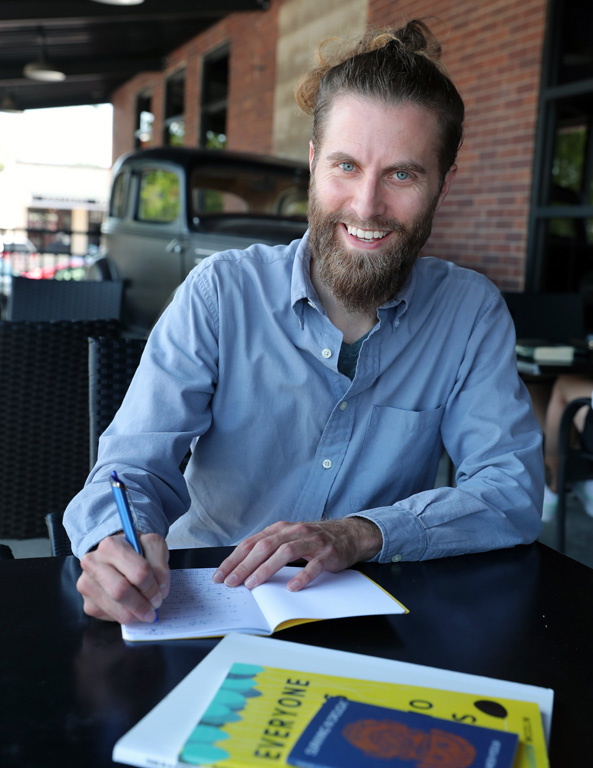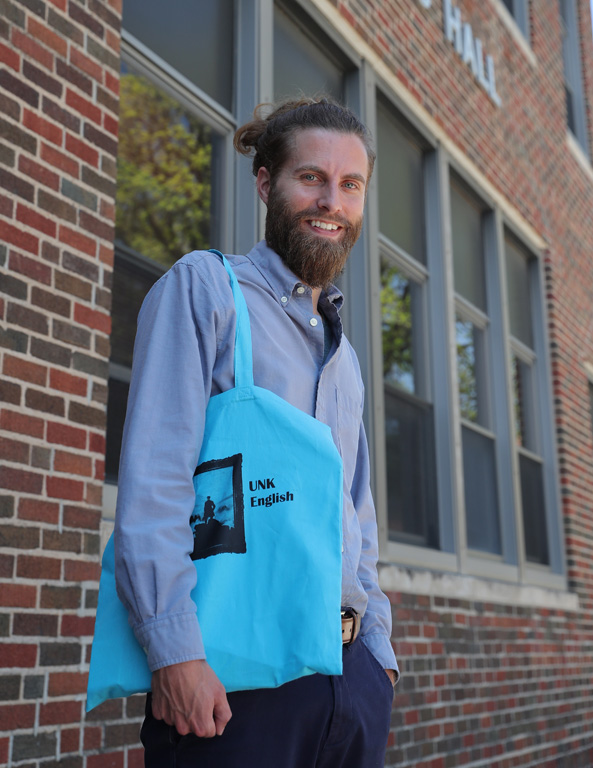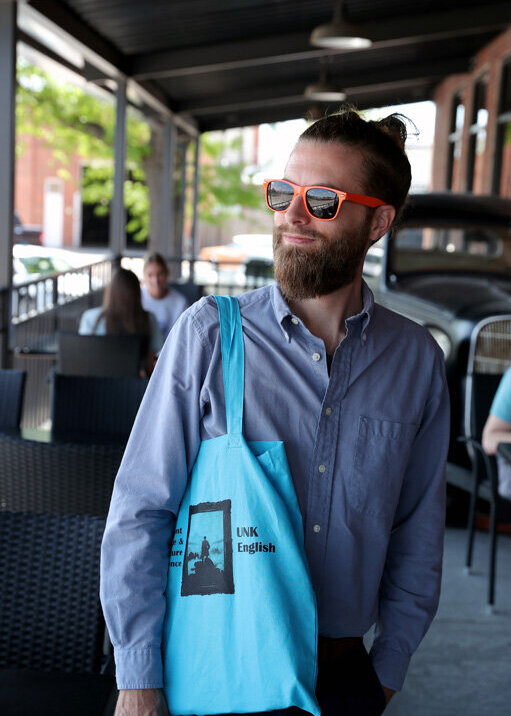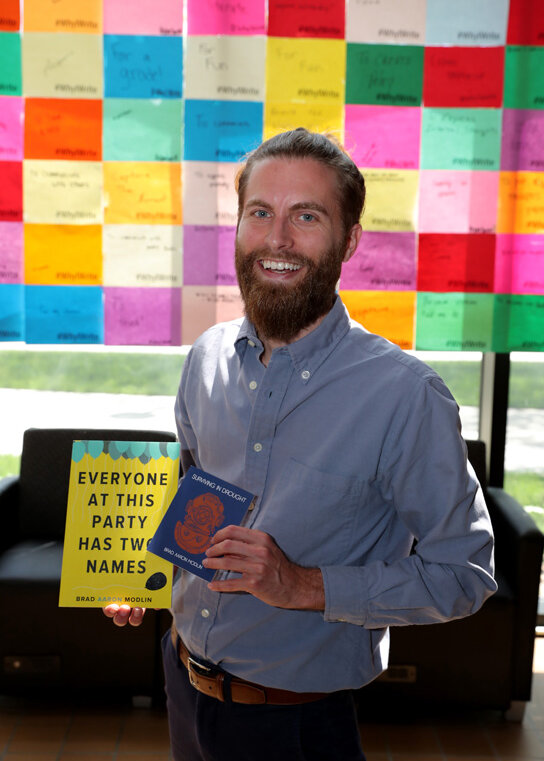
VIEW THE 2023 NEW FRONTIERS MAGAZINE FEATURING MODLIN AND OTHER UNK FACULTY
By TODD GOTTULA
UNK Communications
KEARNEY – Brad Modlin has a consistent message for his students.
“Everything you write teaches you how to write,” he often tells them.
“My writing and publishing practice offers me new lessons to share with my students. Again and again, I experience the mystery, fun and self-doubt my students experience.”
At the University of Nebraska at Kearney, where Modlin is the Reynolds Endowed Chair of Creative Writing and an associate professor of English, students are encouraged to test their boundaries and grow creatively.
“Poetry is trending among all ages right now. It’s an exciting time, so people have a lot of questions and enthusiasm,” Modlin says. “Students’ enthusiasm and mine ping off each other, and we talk quickly and brainstorm aloud. That strength of mine – of watering new ideas – fuels the day.
“Because students break rules they don’t yet know exist, they give me fresh ideas for my work.”
Writing comes with much freedom, but it’s not as “subjective” as people might think, Modlin says.
He uses a kitchen metaphor to illustrate this point: “You don’t throw asparagus and strawberries onto a tray to get a delicious clam chowder. Someone who has made a vocation of cooking can teach you about timing and secret ingredients, about how a bay leaf brings out the best flavors around it.”
This approach fosters an environment where students are encouraged to test their boundaries and grow creatively.
Modlin firmly believes that his writing and teaching are inseparable.
“I wouldn’t be the teacher I am without my writing, and I wouldn’t be the writer without the teaching.”

How do you measure success as a researcher? What motivates you?
If I enjoy reading my work again and again – in front of an audience or at my kitchen table – that’s success. Writing, we’re making something that never existed before and sharing it with a reader maybe we’ve never met. We’re talking to a stranger and believing neither of us is strange. When those readers email me to say my work impacted them, offered them a new optimism or made them feel less lonely/weird – or as I heard once from Switzerland, helped them in their 12-step program – l want to write more.
What is your biggest strength as a researcher?
An idea pops up. A title. A funny quip. A quiet observation. And I don’t scare myself out of it by asking if the idea is stupid or embarrassing or boring or cliché. I grab my laptop and start to imagine many lines or moments – not even drafts yet. What, already, are my favorite parts of this fledging project? I want to spend more time with those parts. Writer’s block is not that you don’t have an idea – you always have an idea. Writer’s block is when your idea is a wildflower seed you don’t trust to be worth looking at, so you throw it in the trash. I’m good at noticing lots of ideas and asking, “What if, what if?” Because of that, I feel my writing has a lot of variety and energy.
What do you want people to take away from your work? What sets your research apart from others?
The past few years my poems look at contemporary anxiety and hope, balancing between 1) how things often are our separation, our embarrassment, our overwhelming feelings as individuals in little cars listening to global news problems, and 2) how things can be – strangers helping each other, elephants reminding us we don’t have to be cool, astronauts seeking a better world and realizing it’s on Earth.
Because my work has gone viral several times, I’ve had the chance to read thousands of comments online. People say my work affects them profoundly, helps them live well and saves them from panic attacks. Recently a reader emailed to say he’d spent an hour with his therapist going over my poem line by line and that it spoke to his past and the future he wanted to build.
My work knows each of our days is a bit tragic, a bit hilarious, a bit clumsy and a bit breathtaking.
Talk about your upbringing. What mentors in your youth led you down this career path?
My grandfather and father worked in radio news, so I grew up around synonyms and carefully chosen words. For decades, my father has had a passion for songwriting. No matter how tired, every day he came home and spent at least 30 minutes writing songs on his guitar. Now I realize that showed me to prioritize one’s art. The art gave him energy for the long days.
In seventh grade, Mrs. Nelson played Traci Chapman’s “Fast Car” in school and called it poetry. The song was a whole, sad story compacted into a few minutes. And it was a song for grownups that she had confidence in us to understand.
The other day, I said to myself, “Let’s name 40 people who have helped me in the past month.” It didn’t take long. So many help us along the way, like my Master of Fine Arts mentor, Larissa Szporluk. One evening we all left the classroom because the sunset was too jaw-dropping to stay on that side of the window. She taught us to let beauty interrupt.
What is the most challenging part of research?
Sometimes it takes forever to perfect a piece of writing, and you think, “What’s taking so long? And isn’t this the age of productivity? And isn’t my value as a 21st-century person based on output? And didn’t I just tell my students that Mary Shelley wrote all of ‘Frankenstein’ in only one weekend?” And then you go jogging and write a smidge more. Call me a hippie, but I think life brings us new experiences and questions that the work needs. Sometimes I must remind myself that the work requires more time because one of its gems hasn’t been lived yet.
What stands out about UNK’s research programs?
It’s encouraging to be part of the English Department, where my colleagues actively research and write and are recognized experts in their fields. There’s always someone to congratulate!
Tell us about a time in your life when you worked the hardest.
I like experiments and challenges like the January Writing Blitz students and faculty undertook this year, writing a ton in 15 days. During the long, scary first summer of the pandemic, I wrote a hundred poems and put a book manuscript together in a hundred days. Even if the world wasn’t making sense, I could puzzle lines into poems. My Master of Fine Arts thesis and Ph.D. dissertation, both creative writing projects, were a ton of work, too.
PHOTOS BY ERIKA PRITCHARD, UNK COMMUNICATIONS
BRAD MODLIN
Title: Associate Professor, English; Reynolds Endowed Chair of Creative Writing
College: Arts and Sciences
Education: Ph.D. in creative writing, Ohio University, 2016; Master of Fine Arts in creative writing, Bowling Green State University, 2008; Bachelor of Arts in English with an emphasis in creative writing and organizational communication, Murray State University, 2005.
Years at UNK: Six
Areas of Research/Specialization: Poetry writing and other forms of creative writing (fiction and creative nonfiction), creative writing pedagogy and the relationship between writing/imagination and hope. “A lot of my writing deals with our relationships with strangers. With the individual as an icon of the collective. Readers find many lists or catalogs in my work: This, and this, and XYZ, and also this, because all the aspects of our lives – everything on our minds – add up to our present moment, just as the whole community affects one person. Also, let’s be honest, life today is often a stacking of information. And notifications, and fear of missing out, and did you hear the latest? And where did I park my car?”
Courses Taught: Introduction to Creative Writing: Fiction, Nonfiction, Poetry; Beginning Poetry Workshop; Creativity & Creative Thought; Advanced Poetry Workshop; Poetic Strategies (Craft & Technique); Graduate Poetic Strategies (Craft & Technique); Graduate Poetry Workshop; Graduate Creative Nonfiction Workshop; Graduate Colloquium: Justice, Inclusion, Fascination, Entertainment, Well-being, Kindness, and Other Reasons We Write; Graduate Colloquium: Writing the/Our Environment(s): Nature, Culture, Identity, and Climate Change(s); Graduate Flash Fiction Workshop
Recent Published Articles: “What You Missed That Day You Were Absent from Fourth Grade,” The Slowdown podcast/public radio show hosted by U.S. Poet Laureate Ada Limón, 2022. “To the Astronaut Who Hopes Life on Another Planet Will Be More Bearable,” Canadian Broadcasting Corporation, 2022. “Before You Comprehend Particle Physics, You Must Look at the Empty Styrofoam Cup and Know It Is You,” Beloit Poetry Journal, 2023. “Everyone at This Party Has Two Names,” book of poems, winner of the Cowles Prize, 2015. “Surviving in Drought,” short story, winner of The Cupboard contest, 2016.




